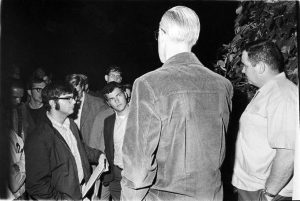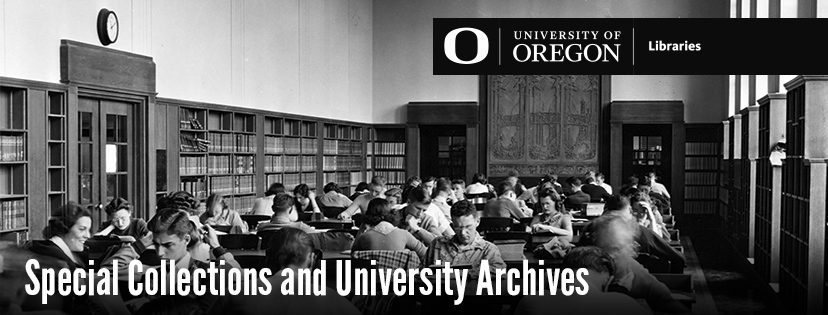President Clark: Contentious Times

This is the fifth of a series of blog posts highlighting the ongoing work of the Documenting UO History Project within the University Archives. A major part of this project is researching and documenting the often untold and hidden histories of the university’s diverse and underrepresented communities. This year our focus will continue to highlight Black history on campus, specifically Black student activism from the 1960s to present. Prior posts can be seen here.
President Robert D. Clark began his tenure at Oregon in 1969 and remained president until 1975. As far as students were concerned, Clark had large shoes to fill as the replacement to President Flemming, who had been incredibly popular with students from all walks of life and who especially championed the rights of minority students. Fortunately for Oregon students, President Clark came into the job with a wealth of experience, and was known as a progressive administrator. Prior to his presidential tenure at the University of Oregon, Clark served as the President of San Jose State University from 1964 to 1969. Students and faculty appreciated Clark’s ardent defense of civil rights issues, which included his unwavering support of Olympians John Carlos and Tommie Smith. This post will explore Clark’s relationship with student activists in his first years at the University of Oregon.
Clark’s presidency was during one of the University of Oregon’s administration’s most challenging eras, war protests, civil rights and the feminist movement were peaking across the country. Large-scale protests at the University of Oregon campus grew hostile by 1970, including a bomb detonation in the basement of Prince Lucien Hall, and the burning of the ROTC building, a trend seen on campuses around the country.
Despite facing incredible challenges from anti-war demonstrators and civil rights activists, President Clark was known to have an open-door policy with student groups, including the Black Student Union. Clark supported free speech for students, including anti-war protesters, women’s rights groups and civil rights activists. In an address at the Western Interstate Commission for Higher Education in Arizona in 1969, Clark said, “Students should be given maximum control, within university policies. And they should be given a voice in the development of those policies.”
In one of Clark’s early statements to University of Oregon students in April of 1970, Clark addressed protest concerns while also expressing his support of students. In the memorandum to all students and staff, Clark wrote, “Nonetheless, I understand why some students were aggrieved and agitated by the presence of police on campus… I agree with the senate that we need a full discussion with students and staff involved. Should students wish, if they think such an approach would be profitable, I personally would be glad to meet with them on Saturday morning in the EMU Ballroom to allow them to make presentations.” Although Clark was careful to appease both local leadership and students, he made himself available to all students.

In May of the same year, President Clark surprised many students, particularly war protesters, by sending a telegram to U.S. President Richard Nixon urging him to call an end to the Vietnam War. In the telegram to President Nixon, Clark wrote, “An overwhelming sense of frustration and despair has engulfed our American colleges. This impels me respectfully to urge a reconciliation with our young people and a reconsideration of military decisions. Young lives have been lost from Vietnam to Ohio. We mourn these tragic deaths and plead for the hand of love and understanding to be extended to our young.” Despite winning praise from war protesters, Clark’s gesture had become a popular move from university presidents across the country.
Although it took many years to develop, one of President Clarke’s first actions was to approve an ethnic studies center. A news release from October 1969 states, “President Robert D. Clark has approved an allotment of $17,000 to the student senate for the establishment of an ethnic studies program. The program will have representatives of the three minority student unions, Black, Chicano, and American Indian, who will decide how each particular group wishes the program to run.” Despite gaining widespread support from students, the ethnic program and black studies program hit countless snags over the years. In 2015, nearly 40 years after the initial requests for a black studies program, Black Student Union members are still requesting similar support.

Much like Flemming, Clark was a forward thinker and an advocate for students. Despite being a supporter of civil rights and students of color, very little of the Black Student Union’s list of demands from 1968 were fulfilled during Clark’s tenure. The trend seems to suggest that a progressive university president is not enough to combat the institutionalized racism that still permeates throughout the University of Oregon campus. Real change will require the support of the entire staff, the Board of Trustees and the community as a whole. Within a broader context, racism has permeated the city of Eugene and the state of Oregon’s past and present.
Our next blog posts will include information from a recent interview with 2015 Oregon graduate and Black Student Union member Anetra Brown. Brown was able to share insights into her experience in Eugene and her current work with the Black Alumni Association. In spring of 2017, we will share more information on Clark’s presidency, while also uncovering President’s Boyd and Olum’s tenures regarding black student activsim.
Each month new blog posts will include recent findings as part of the overall project and research. This is a very collaborative and open project so we welcome all participation and topic suggestions. This project will only be successful with a diverse community of scholars and students working together to find and document these testimonies. If you or anyone you know is interested in contributing to the process or participating in an oral history interview please contact us.
Joseph Foley
Student Research Assistant
Documenting UO History Project
Information for this article was collected from the following sources:
Mosen, Emily. The Reserve Officers’ Training Corps: Protests and Perspectives on the University of Oregon Campus in 1969 and 1970. University of Oregon: Clark Honors College, 2005. (available via Scholars Bank)
“Office of the President: History.” Accessed April 03, 2017.
President Robert D. Clark’s Records (UA 001.012), Special Collections and University Archives, University of Oregon, Eugene, Oregon.
Images from University Archives Photographs, UA Ref 3, Special Collections and University Archives, University of Oregon, Eugene, Oregon. Available via Oregon Digital

